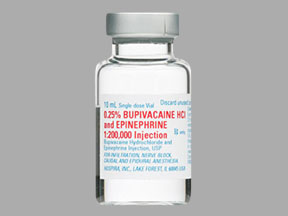
Marcaine/epinephrine Pf Coupons & Savings Card – Discount Prices from $1.01
Brand for: Bupivacaine-epinephrine (pf)
Marcaine with Epinephrine is a local anesthetic solution combining bupivacaine hydrochloride, which numbs specific areas of the body, and epinephrine, a vasoconstrictor that narrows blood vessels to prolong the anesthetic effect. This combination is commonly used in adults for various procedures, including surgeries, dental work, and diagnostic tests, to provide effective pain relief. The solution is available in different concentrations, such as 0.25% and 0.5%, to suit various medical needs. It's important to note that multiple-dose vials of Marcaine with Epinephrine contain preservatives like methylparaben and should not be used for certain procedures, such as caudal and lumbar epidural blocks. Additionally, this medication contains sodium metabisulfite, which may cause allergic reactions in some individuals, particularly those with asthma. Therefore, it's crucial for healthcare providers to assess patients for potential allergies before administration.
Our Marcaine/epinephrine Pf coupons are free to use. You can print the coupon, email it to yourself, or receive the Marcaine/epinephrine Pf coupon via text message. To get your free discount, show the pharmacist your Marcaine/epinephrine Pf savings card which has the discounted coupon price. Use our filters below to edit the prescription box to match your needs. The Marcaine/epinephrine Pf prices will update based on your prescription needs. Above our Marcaine/epinephrine Pf coupons, you can change the location to see pharmacy prices in other areas. Our prescription discount card will update online with the specific pharmacy costs associated with your edits. Be sure to text, email, or print the Marcaine/epinephrine Pf savings card code that you need after editing the prescription box and location field. Show the discount card to your pharmacist before paying.
My prescription
Edit
10ML of 0.25%-1:200000, Bupivacaine-epinephrine (pf) (1 Vial)
Select pharmacy

CVS
$22.47
COUPON PRICE
Walmart
$1.01
COUPON PRICE
Albertsons
$4.62
COUPON PRICE
Walgreens
$4.62
COUPON PRICEMarcaine/epinephrine Pf savings card
Show this card to your pharmacist
Walmart
$1.01
BIN
ID
PCN
GRP
019876
LH2543C8CF
CHIPPO
LHX
Powered by
Marcaine with Epinephrine is a local anesthetic solution combining bupivacaine hydrochloride, which numbs specific areas of the body, and epinephrine, a vasoconstrictor that narrows blood vessels to prolong the anesthetic effect. This combination is commonly used in adults for various procedures, including surgeries, dental work, and diagnostic tests, to provide effective pain relief. The solution is available in different concentrations, such as 0.25% and 0.5%, to suit various medical needs. It's important to note that multiple-dose vials of Marcaine with Epinephrine contain preservatives like methylparaben and should not be used for certain procedures, such as caudal and lumbar epidural blocks. Additionally, this medication contains sodium metabisulfite, which may cause allergic reactions in some individuals, particularly those with asthma. Therefore, it's crucial for healthcare providers to assess patients for potential allergies before administration.
Our Marcaine/epinephrine Pf coupons are free to use. You can print the coupon, email it to yourself, or receive the Marcaine/epinephrine Pf coupon via text message. To get your free discount, show the pharmacist your Marcaine/epinephrine Pf savings card which has the discounted coupon price. Use our filters below to edit the prescription box to match your needs. The Marcaine/epinephrine Pf prices will update based on your prescription needs. Above our Marcaine/epinephrine Pf coupons, you can change the location to see pharmacy prices in other areas. Our prescription discount card will update online with the specific pharmacy costs associated with your edits. Be sure to text, email, or print the Marcaine/epinephrine Pf savings card code that you need after editing the prescription box and location field. Show the discount card to your pharmacist before paying.
Marcaine/epinephrine Pf (Bupivacaine-epinephrine (pf)) dosage forms
Use our Marcaine/epinephrine Pf (Bupivacaine-epinephrine (pf)) 10ML of 0.25%-1:200000 coupon with prices from $1.01 for 1 Vial. You can also use our Marcaine/epinephrine Pf (Bupivacaine-epinephrine (pf)) 10ML of 0.5%-1:200000 coupon with prices from $1.01 for 1 Vial. We have a Marcaine/epinephrine Pf (Bupivacaine-epinephrine (pf)) 10ML of 0.5%-1:200000 coupon with prices from $3.77 for 2 Vials. You can use our Marcaine/epinephrine Pf (Bupivacaine-epinephrine (pf)) 10ML of 0.5%-1:200000 coupon with prices from $8.15 for 3 Vials.
Dosage Quantity Price from Per unit 10ML of 0.25%-1:200000 1 Vial $1.01 $1.01 10ML of 0.5%-1:200000 1 Vial $1.01 $1.01 10ML of 0.5%-1:200000 2 Vials $3.77 $1.89 10ML of 0.5%-1:200000 3 Vials $8.15 $2.72 10ML of 0.25%-1:200000 2 Vials $3.14 $1.57 10ML of 0.25%-1:200000 3 Vials $7.21 $2.40
| Dosage | Quantity | Price from | Per unit |
|---|---|---|---|
| 10ML of 0.25%-1:200000 | 1 Vial | $1.01 | $1.01 |
| 10ML of 0.5%-1:200000 | 1 Vial | $1.01 | $1.01 |
| 10ML of 0.5%-1:200000 | 2 Vials | $3.77 | $1.89 |
| 10ML of 0.5%-1:200000 | 3 Vials | $8.15 | $2.72 |
| 10ML of 0.25%-1:200000 | 2 Vials | $3.14 | $1.57 |
| 10ML of 0.25%-1:200000 | 3 Vials | $7.21 | $2.40 |
Marcaine/epinephrine Pf FAQs
Using the SaveHealth discount card, what is the price of Marcaine/epinephrine Pf without insurance?
Using the SaveHealth discount card, the price of Marcaine/epinephrine Pf without insurance is $1.01.
What is the price of Marcaine/epinephrine Pf at CVS?
The price of Marcaine/epinephrine Pf at CVS is $22.47.
What is the price of Marcaine/epinephrine Pf at Walgreens?
The price of Marcaine/epinephrine Pf at Walgreens is $4.62.
What is the price of Marcaine/epinephrine Pf at Walmart?
The price of Marcaine/epinephrine Pf at Walmart is $1.01.
